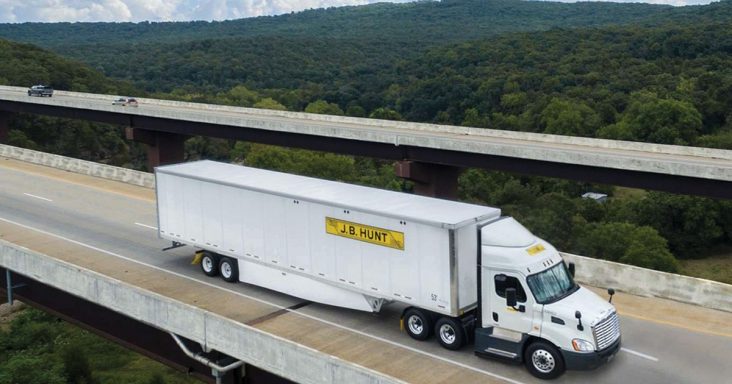J.B. Hunt looks to cut emissions by almost one-third in 12 years
by November 14, 2022 3:52 pm 1,164 views

Lowell-based carrier J.B. Hunt Transport Services Inc. has set a goal to reduce its carbon emission intensity by 32% by 2034, from 2019 levels, according to a Monday (Nov. 14) news release.
Following are the three areas the company will focus on to reduce emissions:
- Incorporate alternative-powered equipment into the fleet
- Expand the use of biogenic fuels
- Improve fuel economy, including diesel-powered trucks.
“Our roadmap to achieving this aspirational goal will help J.B. Hunt strive to significantly reduce our carbon emission intensity while holding true to our customer commitment of providing efficient, quality-driven, competitive supply chain solutions for moving their freight,” said Craig Harper, chief sustainability officer and executive vice president at J.B. Hunt. “Our goal is an ambitious challenge to improve J.B. Hunt’s carbon footprint and to help advance the transportation industry’s progress in developing sustainable solutions that are commercially viable and scalable for widespread adoption.”
According to J.B. Hunt, its 2019 carbon emission intensity ratio was 112 metric tons of carbon per million company-operated ton miles. By focusing on intensity, the company’s goal can account for business growth while showing emissions improvement per unit.
According to the release, J.B. Hunt’s emissions goal is aligned with the goal in the Paris Climate Agreement to limit global warming to 2 degrees Celsius. Reaching the company’s goal will depend on the development and availability of new industry technology and the infrastructure needed to enable their daily use on a wide scale. Developments include ongoing enhancements to trucks, charging and refueling infrastructure, expanded capacity of the electrical grid, increased availability of biogenic fuels and the use of more energy resources with lower carbon intensity.
The release shows that the carrier’s reduction in emissions is expected to positively impact the supply chain and help customers reduce their overall carbon footprint. The carrier noted that converting a freight shipment to intermodal from an over-the-road truck reduces the shipment’s carbon footprint by an average of 60%. Earlier this year, J.B. Hunt announced expanding its intermodal container fleet to as many as 150,000 containers in the next three to five years.
Over the past decade, the carrier’s intermodal service has helped to avoid nearly 30 million metric tons of carbon emissions from over-the-road truck transportation, according to the release. Since 2020, the company’s technology platform J.B. Hunt 360 has provided freight visibility that’s helped company drivers avoid almost 6 million empty miles, or when trucks are moving without freight. However, the carrier noted that emissions avoided by intermodal and empty-mile reduction don’t contribute to it achieving its reduction target.
In 2017, J.B. Hunt reserved 40 Tesla Semi electric trucks to be used for West Coast operations. In 2018, J.B. Hunt revealed the addition of the first electric trucks to its fleet: five Mitsubishi Fuso eCanter trucks. In 2020, the carrier started testing the battery-electric Freightliner eCascadia and completed its first delivery with a class 8 electric truck, the largest truck class. In 2021, J.B. Hunt announced testing hydrogen-fueled trucks starting at the end of this year. By 2035, the company plans to convert at least 25% of its day cab and straight truck fleet to an alternative power fuel source.
Asked about when it would receive the Tesla Semis, J.B. Hunt officials said, “we cannot provide a comment on this topic.” Regarding the Mitsubishi Fuso eCanter trucks, J.B. Hunt said the leased vehicles are no longer a part of the company’s operations but provided “first-hand experience into alternative power vehicles.” The 2020 pilot of the Freightliner eCascadia allowed J.B. Hunt drivers in Los Angeles to drive an all-electric truck and provided the company with insights regarding vehicle range and charging.
J.B. Hunt has yet to start testing the hydrogen-fueled trucks. “We do believe it is a good alternative fuel source and will continue to explore the benefits and possible implementation,” according to the company. It expects to purchase its first battery-electric vehicle “within the next few months.”
Shares of J.B. Hunt (NASDAQ: JBHT) closed Monday at $186.27, up 87 cents or 0.47%. In the past 52 weeks, the stock has ranged between $153.92 and $218.18.
